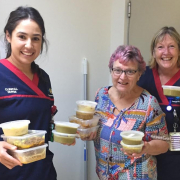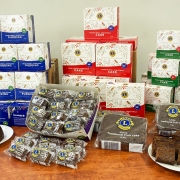Lion Karen Feeds the Multitude
When Covid-19 first started spreading in Australia, Western Australian nurse Karen Molcher feared the worst. Karen, a nurse for much of her life, had seen one of her own sisters in the UK come down with a suspected case, and being English-born she had watched in horror as the disease wreaked havoc across that nation.
“I was watching all that happened there and I knew how bad it was,” she says. “In the Iittle hospital near where my sisters lived, they had more deaths in one day than we then had in the whole of Australia.”
A 17-year Lion with the Gosnells club, Karen was working casual shifts at the local Armadale hospital but desperately wanted to do more. “It was crazy,” she says. “We were putting doors on areas that didn’t have doors, doing PPE training, looking at process and everything. I was sitting at home thinking ‘I just want to be at work helping’. I felt guilty because at that time I was probably working 20 hours a week. Then wards started to close because they stopped elective surgery, so they were bringing staff into emergency.”
That’s when Karen, then secretary of Gosnells Lions Club, saw her chance. She had noticed doctors and nurses around her were skipping meals, too busy to eat during shifts and too tired to eat healthily away from work. “Our doctors work rotating shifts – afternoons, mornings and nights – and our cafe wasn’t as operational,” explains Karen.
“The only thing they had food-wise at the hospital was one loaf of bread and some margarine. As I sat there one day watching a young doctor, I said ‘you can’t eat just that’. ‘I haven’t got time,’ he replied.”
After speaking to her husband, PDG Dave Molcher, Karen, a keen cook (she calls herself “a feeder” because of her need to feed others), approached hospital management to cook up meals herself for staff. As she had extensive training in quality and infection control, it agreed.
Turning their kitchen into a process line and with Dave as chief kitchen hand, Karen spent her days off preparing vast quantities of everything from barbecue sausages and bean casserole and minestrone soup to chilli con carne. Meals were frozen and, using a freezer from their caravan, were stockpiled at the hospital so staff could help themselves. A menu of the frozen ready-to-eat dishes was displayed daily to make choosing easier.
Instantly staff, many of them single and living alone, took to the service. With the support of nurse manager Carmen Callaghan, the initiative grew in popularity. In nine weeks and despite being called into the hospital’s Covid clinic to work extra shifts, Karen produced a phenomenal 550 meals to feed her work stressed colleagues.
When Karen and Dave’s food bills started mounting, they approached fellow Gosnells Lions for help.
A Zoom meeting quickly decided the club was in – although because of health and safety requirements it was purely on a monetary basis. Initially a budget of $500 was discussed but rejected, the club preferring to tip in “whatever is needed”.
Along with her cooking project, at the same time Karen found herself at the centre of a Gosnells Lions Club hat-making initiative. With her time taken up working hospital shifts or cooking meals, she began suffering “bad Covid hair”.
“I was going into the Covid Clinic and my hair was getting so washed out because when we left work we were showering each time. “So I went to one of the girls, Lion Kath Beech, and asked ‘can you make me one of these scrub hats if I send you a pattern?’.” Soon other hospital staff were seeking colourful scrub hats just like Karen’s. “I can’t sew to save my life but Kath and Sandra Waters and friends of the club collaborated together to sew and produce enough hats for healthcare workers at the Armadale Hospital. They ended up making 100 of them. “Kath had her quilting friends helping her and a couple of non-Lions helped. We involved the public because they just wanted to do things. The hats brightened us all up at a difficult time and everyone had so much fun.”



